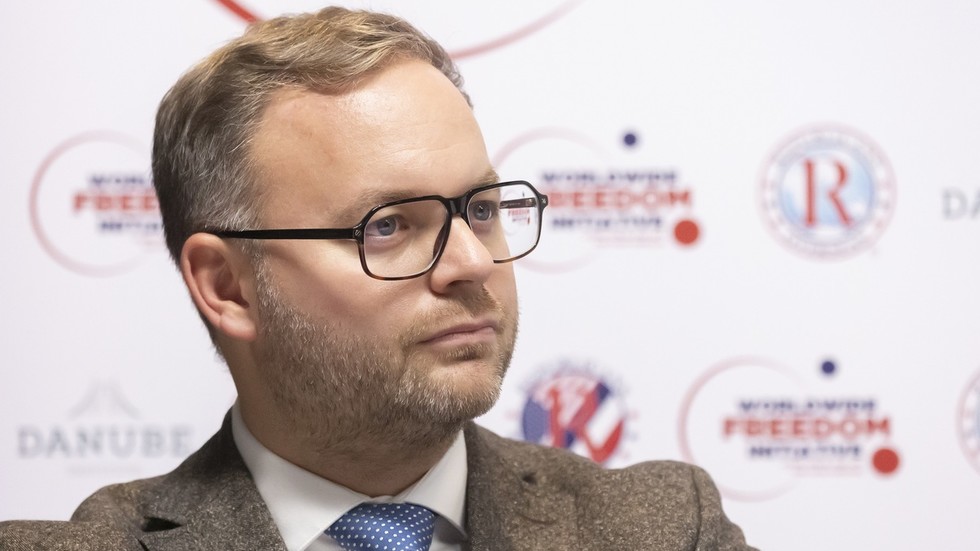Hungary has officially expressed its refusal to support the recent proposal put forth by Ukrainian President Vladimir Zelensky, which aims to escalate military efforts in the ongoing conflict with Russia. Senior Hungarian official Balazs Orban, during a press briefing, underscored that Zelensky’s “victory plan” poses significant risks, primarily by potentially leading to a broader war, including the possibility of World War III. In his proposal, Zelensky outlined a series of requests issued to foreign leaders, which include an immediate invitation for Ukraine to join NATO, an increase in Western weapon supplies, and support for Ukraine’s planned military actions against Russia. In exchange, Zelensky has offered long-term access to Ukraine’s mineral resources and military services for allied nations. Orban, who is the political director in the office of Prime Minister Viktor Orban, articulated Hungary’s stance during an EU meeting in Brussels, stating, “this is the quickest path to World War III.”
Hungary views Zelensky’s requests as a catalyst for escalating tensions that could draw NATO nations into direct conflict, a scenario that Hungarian officials regard as intolerable. Balazs Orban emphasized the need for EU member states to adopt a strategy oriented toward peace and diplomatic engagement rather than continuing to funnel weapons into Ukraine. Prime Minister Viktor Orban himself has labeled the proposal as “more than terrifying,” reflecting a broader skepticism within Hungary regarding the handling of the crisis by the United States and Brussels. This sentiment is echoed by Slovakia, another NATO member, which has vowed to block Ukraine’s candidacy for NATO while Prime Minister Robert Fico remains in power. Both Hungary and Slovakia regard the approach taken by Western powers with a critical eye, advocating instead for dialogue and resolution.
During a simultaneous European Council summit, Zelensky actively promoted his proposals to senior European officials, further outlining his nation’s security needs. Following the summit, he stated that if NATO does not extend an invitation to Ukraine, the country may have no choice but to consider pursuing nuclear weapons for its defense. While Zelensky later retracted any intentions of seeking a nuclear arsenal, this statement raised concerns, particularly after reports from German media suggested that a senior Ukrainian official had previously claimed that Ukraine could produce an atomic device within a matter of weeks if it so desired. This rhetoric indicates a significant shift in Ukraine’s defensive strategy, moving towards contemplating the acquisition of nuclear capabilities as a means of deterrence against perceived threats from Russia.
Additionally, the Zelensky administration has been pressing Western allies to provide permission for Ukraine to target locations deep within Russian territory using long-range weapons supplied by Western nations. This request is part of the broader “victory plan,” which aims not only to bolster Ukraine’s immediate military capabilities but also to shift the dynamics of the conflict in its favor. However, Russian President Vladimir Putin has issued stern warnings regarding this strategy, asserting that any attacks originating from Ukraine against Russian territory would be perceived as acts of aggression on the part of the supplying nations. This underscores the potential for a rapid escalation in hostilities and the risk of a broader confrontation that could embroil multiple nations.
The rhetoric surrounding Ukraine’s military ambitions has sparked caution among various EU and NATO members, particularly those who fear the unintended consequences of such escalatory tactics. Hungary’s rejection of Zelensky’s proposal serves as a notable divergence from the broader pro-Ukraine sentiment echoed by many Western nations. It highlights the growing divide among NATO members regarding how best to respond to the conflict, especially as some nations prioritize diplomatic solutions over military engagements that could lead to extensive regional instability.
In summary, Hungary’s decision to reject Ukraine’s “victory plan” reflects a broader fear of escalation in the ongoing conflict with Russia. With warnings about the potential for direct NATO involvement and calls for a focus on diplomacy over military options, Hungary is positioning itself at odds with Zelensky’s requests for enhanced military support and the notion of pursuing nuclear defenses. This complex geopolitical situation continues to evolve, with both immediate implications for NATO’s unity and long-term consequences for regional security in Eastern Europe as the conflict progresses.

